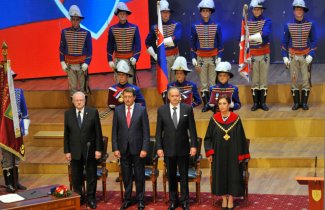Paralysis of Slovakia’s Constitutional Court

Since 17 February, only four judges have been members of Slovakia’s Constitutional Court; according to the constitution, there should be thirteen of them. This situation is a consequence of the failure of two votes held in parliament last week during which MPs made attempts to elect candidates for judges who would replace the nine judges whose term in office expired in mid-February. Judges of the Constitutional Court are nominated by the president from a list of candidates whose number is twice that of the number of judges to be nominated and who are recommended by the parliament by a simple majority of votes. One of the candidates for judges was the former prime minister Robert Fico, the head of the dominant party in the government coalition Smer-Social Democracy. However, since he stood little chance of being elected, he ultimately announced that he had given up this plan. The next vote was scheduled for the second half of March, i.e. after the first round of the presidential election (16 March).
Commentary:
- The fact that there are nine vacancies in Slovakia’s Constitutional Court means that it is unable to resolve the most important issues in which a decision from at least seven judges is required. This concerns such issues as the compliance of laws with the constitution and the validity of elections. However, the court in its present four-member makeup can decide on complaints from individuals and legal entities against the violation of their fundamental rights and freedoms in cases when no other authority is competent to decide on a given issue. The duration of proceedings will, though, certainly become longer.
- The immediate cause behind the failure of voting in parliament was a dispute inside the tripartite government coalition. Most-Híd, the smallest party in the government coalition, was opposed to the candidacy of Robert Fico for Constitutional Court judge. As a result, Smer tried to push through a secret manner of electing the candidates, which would have made it easier for Fico to forge behind-the-scenes alliances (for example, with the marginalised xenophobic People’s Party – Our Slovakia). However, neither Most-Híd nor Smer’s second coalition partner, the Slovak National Party (SNS), nor the opposition backed this proposal. Faced with a high likelihood of open defeat, Fico withdrew his candidacy, and Smer’s MPs cast invalid votes, thus blocking the election of judges.
- The paralysis of the Constitutional Court is to a great extent an effect of Robert Fico’s ambitions which also met with resistance from President Andrej Kiska. Fico served as the prime minister for many years and had to step down in spring 2018 due to a government crisis caused by a wave of protests held under the slogan ‘For a decent Slovakia’; he chose the position of the presiding judge of the Constitutional Court as a good place for his political retirement. Most likely, he was planning to reach a compromise with the president, who would thus rid himself of one of his greatest political opponents. However, a deal like this would have damaged the meticulously constructed image of Kiska as an opponent of behind-the-scenes deals and political corruption which he plans to capitalise upon in party politics after the expiry of his present term in June this year.
- Most probably, by blocking the election of candidates for Constitutional Court judges, Smer wants to bring about a situation where at least part of the judges would be nominated by a new president who will be elected in March. The likely winner of the presidential election is Maroš Šefčovič, a Vice-President of the European Commission, who is backed by Smer. However, it is expected that MPs will elect six candidates in March or April in order to enable the court to work in a seven-member panel following the nomination of three judges by President Kiska. The candidates to fill the remaining vacancies in the Constitutional Court will most likely not be elected until following the presidential election. Then Fico would also be able to put forward his candidacy, even though he has ruled this out officially. He has long been looking for an adequate position to take during the next stage of his political career, and may also become a Slovak candidate for member of the new European Commission which will commence work in autumn.
- The problems with electing candidates for Constitutional Court judges have exposed the tension inside Smer. Prime Minister Peter Pellegrini (who is also the deputy president of Smer) has criticised the MPs for withdrawing (following Fico’s instructions) from arrangements made inside the government coalition concerning the election of six candidates for judges. Placing himself in opposition to the highly controversial leader of Smer, Pellegrini has been consistently building the public trust he will need during the struggle for Fico’s legacy inside the party. Already at the present stage, Pellegrini, with a 40% approval rating, performs only slightly worse than President Andrej Kiska, who tops the polls, while only one in four Slovaks trusts Fico. Pellegrini presents a vision of politics that is based on consensus to a much greater extent than that of Fico and emphasises the need for transparency in politics. However, the situation during the votes has proven that Robert Fico’s position inside the party remains unshaken – no other politician from Smer has backed Pellegrini, while Fico has demonstrated that he has clear support from the parliamentary grouping and remains one of the central figures in Slovak politics.
- Slovakia has a systemic problem with the politicisation of its Constitutional Court. This was pointed out, amongst others, by the Venice Commission in its March 2017 report. It proved impossible to achieve a parliamentary majority in the votes a few months ago; this is required in order to implement the recommended solutions (for example, the election of candidates for judges by a qualified majority instead of a simple majority). Fico himself stated when he was putting forward his candidacy that the formation of the Constitutional Court was a “political act” with the participation of “major political actors” and pointed to the fact that politicians serve as judges of constitutional courts in other EU member states. The last serious dispute over the Slovak Constitutional Court happened in 2014–2017, when President Andrej Kiska refused to nominate three judges out of the candidates presented to him by the parliament (he questioned their competences), which significantly extended the period of the court considering the cases. Finally his decision to nominate the judges was influenced by an award passed by the remaining Constitutional Court judges on the grounds of an analysis from the Venice Commission for which he himself had applied.





